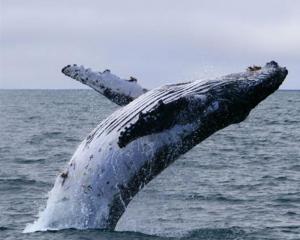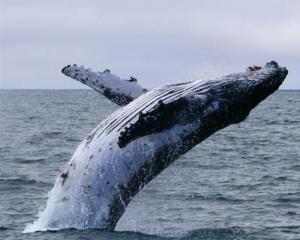Australia is stepping up diplomatic pressure on Japan in a bid to stop this year's whale catch in the Southern Ocean.
Senior ministers have said the nation remains "resolute'' in its opposition to Japan's whaling operations, and to the provocative decision to operate in the Southern Ocean Whale Sanctuary established by the International Whaling Commission.
Australia's initial submissions against the annual hunt have been put to the International Court of Justice in the Hague, but whaling will continue throughout what will be a lengthy and drawn-out process.
But Australia remains concerned at the prospect of dangerous and possibly violent conflict in the Southern Ocean, and has urged anti-whaling activists to avoid action that could put lives at risk.
The radical Sea Shepherd organisation is planning further confrontation this season, announcing "Operation Divine Wind'' - a play on Kamikaze, the wind that saved Japan from Mongol invasion in the 13th century, and the term used for suicide attacks in the Second World War.
"We certainly don't want to see anyone compromise safety at sea, we don't condone (action that) compromises safety at sea,'' Australia's Environment Minister Tony Burke said.
"My message is that everybody should preserve safety at sea.
"We don't want one wrong action compounded by violence and I just urge everybody in situations that could emerge in the Southern Ocean in the coming months simply to work on one simple basis - safety at sea has to remain paramount the whole way through.''
But Mr Burke said there was no justification for continued whaling and Japan should not be sending its fleet to the Southern Ocean.
"Australia unequivocally condemns commercial whaling,'' he said.
"We don't accept that this is scientific, it should not go ahead.''
Mr Burke said Australia had always hoped that it could find a diplomatic solution, but had been forced to take legal action.
After cutting last season's operations short Japan had said it would conduct a review into continued whaling.
But it had not waited for the outcome of that review, and had simply gone ahead and decided that whaling would continue this summer.
"We are making sure, in diplomatic terms, and the terms I'm putting right now that the strongest possible view is put publicly,'' Mr Burke said.
"We do not believe that what they are proposing to do is lawful.''
Australia would also apply further pressure through the International Whaling Commission.
Attorney-General Robert McClelland said Australia's decision to seek a permanent ban on whaling in the Southern Ocean through the International Court of Justice in May last year had not been taken lightly.
"Australia believes Japan's whaling is contrary to international law and should stop,'' he said.
But Mr Burke said no early decision was expected.
"Legal action always takes longer than you want it to, and it still does have some time to run, and that is why the fastest way for this to end is for Japan to reach the conclusion (to stop whaling),'' he said.
Foreign Minister Kevin Rudd said Australia had been especially disappointed by Japan's decision to send its fleet to the whale sanctuary.
"There is widespread concern in the international community at Japan's whaling program and widespread calls for it to cease,'' he said.






